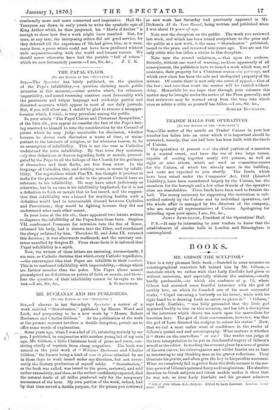THE PAPAL CLAIM.
[TO THE EDITOR OF THE "SPECTATOR.']
SIR,—The Spectator has lately published, on the question of the Pope's infallibility,—a question claiming much public attention at this moment,—some articles which, for calmness, impartiality, and sound reasoning contrast most favourably with the passionate and vulgar language and evidently partial and distorted accounts which appear in most of our daily journals. .But, if you will allow me, I should be glad to remove a misappre- hension which, I think, is very prevalent among the public.
In your article "The Papal Claims and Protestant Sympathies," of the 18th ult., you appear to consider the fact of the Pope's hav- ing reserved to himself to veto the consideration by the Council of points which he may judge unsuitable for discussion, whether because he deems such discussion a waste of time, or unim- portant to the interests of religion, or for whatever reason, to be an assumption of infallibility. This is not the case as Catholics understand the term infallibility. By that term they maintain only that definitions or decrees regarding faith or morals, promul- gated by the Pope to all the bishops of the Church for the guidance of themselves and their flocks, are free front error. In the language of Catholics, this, and nothing more, is meant by infalli- bility. The regulations which Pius X. has thought it prudent to make for the preservation of order in the present Council have no reference to his infallibility. He may have acted judiciously or otherwise, but in no case is his infallibility implicated, for it is not a definition in faith or morals that he has issued, and the supposi- tion that infallibility was claimed for anything besides such a definition would lead to interminable discord between Catholics and Protestants ; they would be fighting because they did not understand what each other meant.
In your issue of the-4th ult., there appeared two letters written to disprove the infallibility of the Popes from these facts. Stephen VII. condemned Formosus for intrusion into the See of Rome, exhumed his body, had it thrown into the Tiber, and reordained the clergy ordained by him. Theodore II. and John IX. reversed this decision; it was afterwards reaffirmed, and the contrary sen- tence annulled by Sergius II. From these facts it is inferred that Papal infallibility is a myth.
Now, the writers of these letters are assuming, unconsciously, I am sure, as Catholic doctrine that which every Catholic repudiates, —the extravagant idea that Popes are infallible in their conduct. This is to confound infallibility with impeccability,—things which are farther asunder than the poles. The Popes above named promulgated no definitions on points of faith or morals, and there- fore the question of their infallibility cannot be brought to the










































 Previous page
Previous page